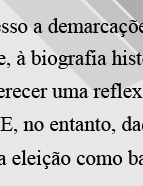

................................
However, while the end of the 1700s was still the time of chronicle literature, from Fr. Cláudio da Conceição'sGabinete Histórico [Historical Cabinet] (1818-1831) to more individual exercises, as well as revised versions of the lives of saints and other Church figures, two circumstances altered both its weight in the overall historiographical production and the conception of history on which it was based.
Firstly, in conjunction with the founding of the ACL, the establishment of rules for good methodological practice fundamentally shaped historiographical work. Indeed, the need to conduct a survey of data on the country's past, a principle largely embodied in the model of the Academy's Memoirs, served to promote a more distinctly erudite register, moving away from the prevailing encomiastic tendency. In this regard, a form of presenting results was developed which, in a more direct and concise news tone, fundamentally subverted the traditional(ist) reference of biographical writing: from compendiums and/or catalogues, mere collections of chronological notes in their most basic version, to dictionaries and comprehensive biographies in their more finished form. This is evident in the work of Francisco Nunes Franklin, who resumed part of the work initiated by Fr. Manuel de Figueiredo on the chief chroniclers of the kingdom, such as António Ribeiro dos Santos and Francisco Manuel Trigoso; and beyond the narrow scope of the ACL and under the developed format of dictionaries, the reference works by José Mazza on musicians in Portugal, by Cirilo Volkmar Machado on its painters and, above all, by Inocêncio da Silva, the most direct heir in the field of bibliography to the tradition remotely inaugurated by Barbosa Machado. Far from being a marginal manifestation, even in the more specific field of life histories, these news collections became a successful (sub-)genre in the centuries that followed, primarily within the methodical tradition whose foundations were being laid.
However, the laudatory tone of historiographical discourse did not disappear completely, even within the context of the ACL, as is abundantly shown by the formal and systematic praise of academics and Crown figures. It was, in fact, inherent in the functions of some of these men who, like Francisco Franklin – author of a chronicle on the first Duke of Braganza – held positions such as Chronicler of the House of Braganza. Nor did the figure of the ecclesiastical historian cease to dominate, as exemplified by another royal chronicler, D. Tomás Caetano de Bem, even though mainly framed by the now-defunct ARHP. By virtue of his functions, this author of biographical works of a religious nature, like many of his peers, also conducted a genealogical work on the kings of Portugal and a 'dictionary' of their illustrious families. However, the direction in which his work, and that of others, was heading, also as he was an excellent organiser of archives, already differed from the essentially panegyric literature.
